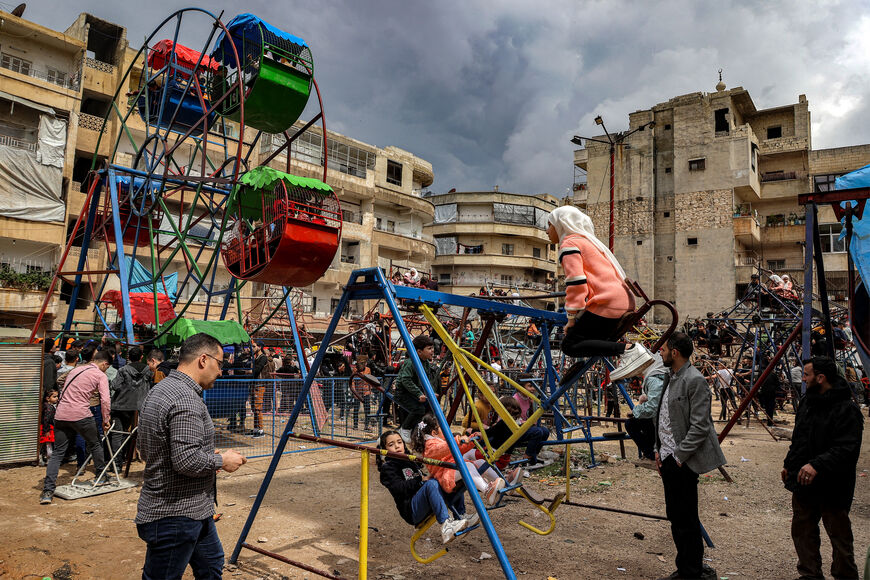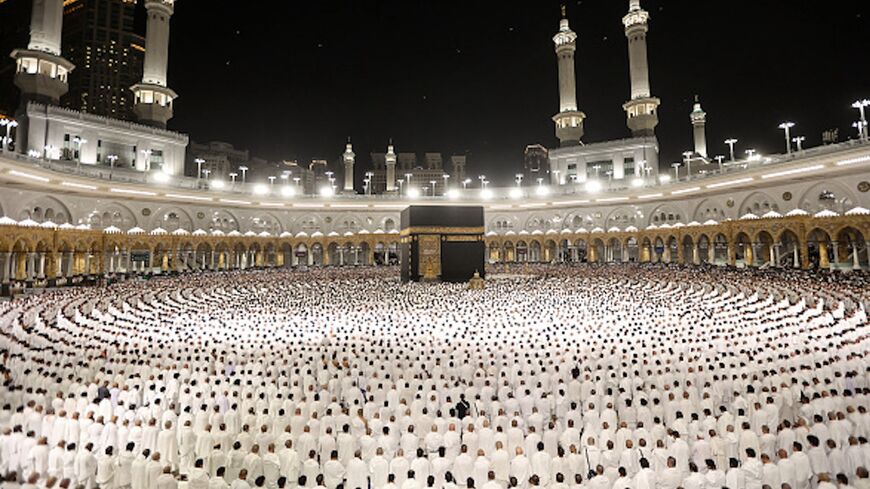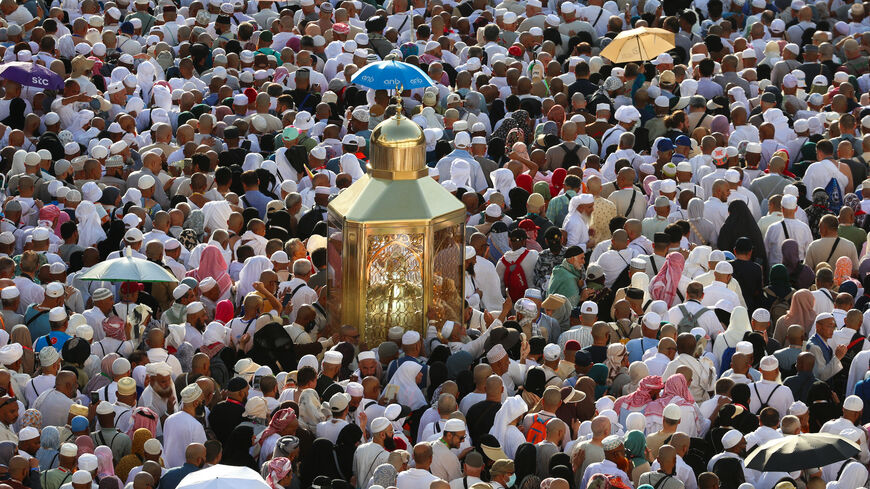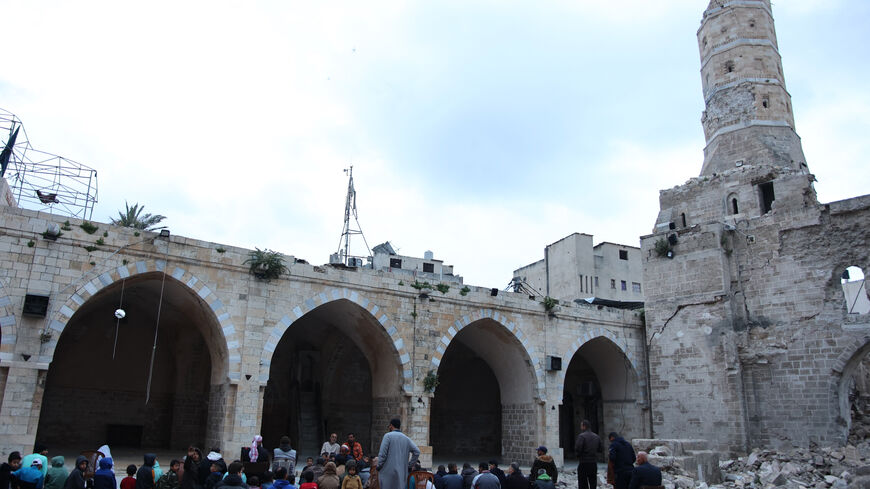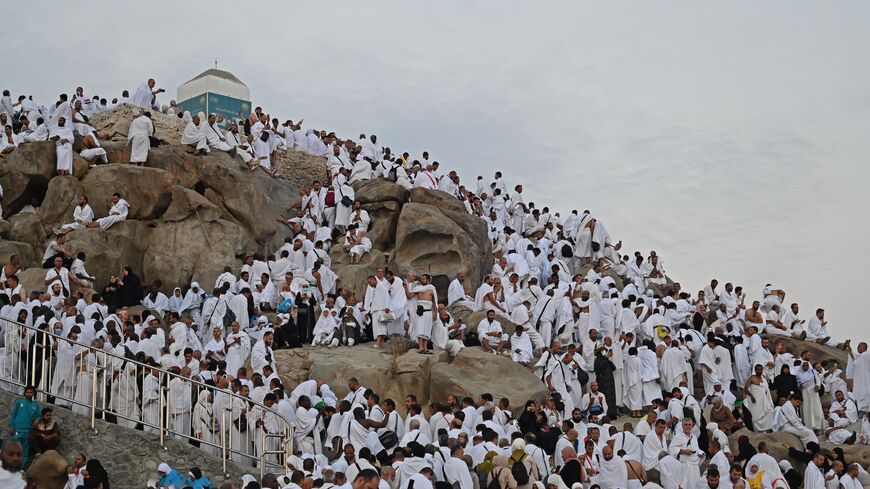Syria to Sudan, Middle East celebrates bittersweet Eid in shadow of war
Pro-Palestinian protests sweep across the region as Muslims mark the first day of religious holiday Eid al-Fitr.
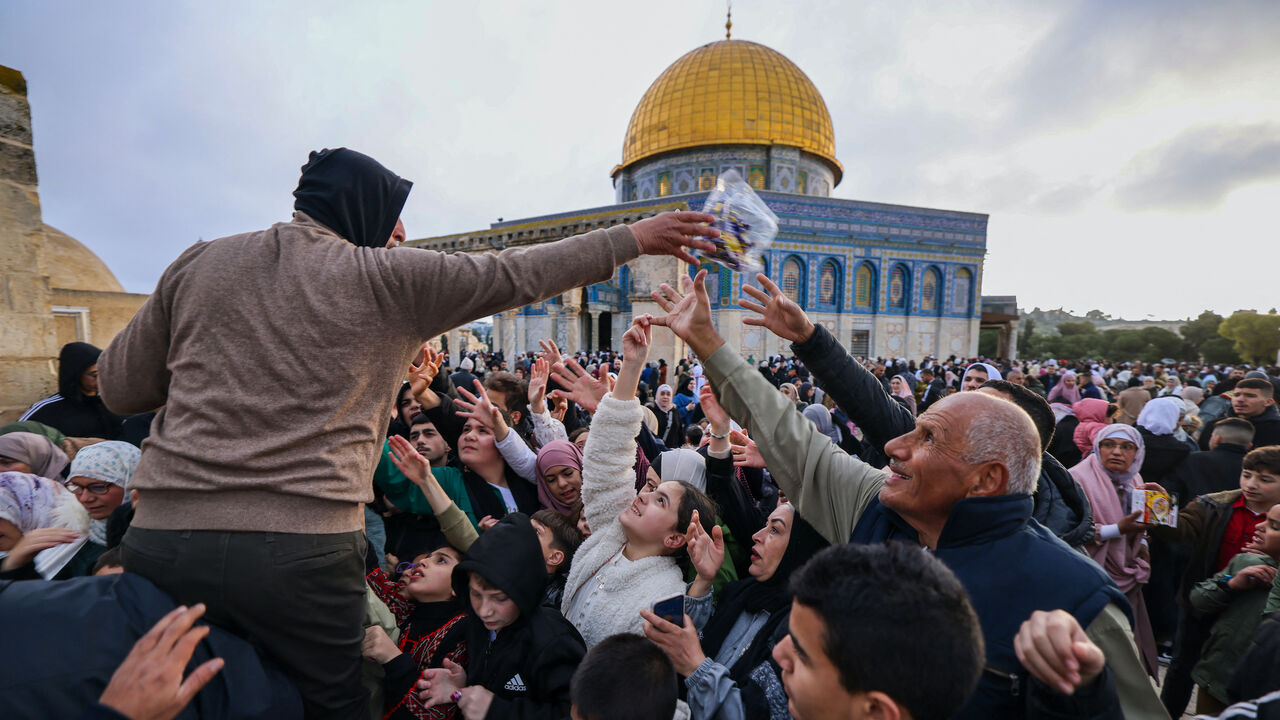
BEIRUT — As the Middle East celebrates the first day of Eid al-Fitr religious holiday on Wednesday, the region remains fraught with conflicts in Syria, Sudan, Iraq, Yemen, Libya and tensions in light of the ongoing Israel-Hamas war in the Gaza Strip.
Eid al-Fitr, which translates into the "Festival of Breaking Fast," is one of Islam’s holiest holidays. It marks the end of the monthlong fast during Ramadan, the Muslim holy month during which Muslims believe the Prophet Muhammad received the teachings of the Quran, according to Islamic traditions.
Muslims around the world observe this day by performing prayers and preparing food to celebrate with relatives for three days. Parents buy their children new clothes, and relatives offer them gifts and money.
Despite the conflicts, death and destruction, Muslims around the region are still celebrating in their own way.
Palestinian Territories
In the Gaza Strip, Eid al-Fitr has been overshadowed by the Israel-Hamas war, which has now raged for more than six months. More than 33,000 people, mostly women and children, have been killed since the start of the war on Oct. 7, according to Gaza’s Health Ministry. The UN's refugee agency, UNRWA, estimates that around 1.7 million others have been displaced from their homes, with the majority crammed into the southern city of Rafah amid the prospect of an imminent Israeli ground invasion.
The humanitarian situation has reached catastrophic levels amid the stifling Israeli siege and the relentless bombardment. Access to aid, food, water and medication has been limited, further worsening the conditions of Gazans, with the UN warning of a looming famine.
People are unable to buy food or new clothes for their children, a once common practice during the Eid.
Videos circulating online showed hundreds of Palestinians performing their morning prayers in shelters and on the ruins of destroyed mosques.
In a video message greeting Muslims on Eid al-Fitr posted on X on Wednesday, UN Secretary-General Antonio Guterres said he was heartbroken that Muslims in the Gaza Strip, Sudan and elsewhere will not be able to celebrate due to wars and famine.
UNRWA Commissioner-General Philippe Lazzarini also deplored the situation of Gazans during this Eid and called for an end to the war.
“This Eid comes as the people of #Gaza go through six months of one of the most brutal wars in recent history. It is very hard to celebrate amid dehumanization, pain and grieving hearts,” he wrote on the X platform.
In the West Bank, the first day of Eid al-Fitr was marked with several Israeli raids and arrests across the territory.
Despite the Israeli restrictions, nearly 60,000 Palestinian worshippers gathered at Al-Aqsa Mosque in Jerusalem, Islam's third-holiest site, to perform the Eid prayers, according to the Palestinian Authority-affiliated WAFA news agency.
The situation in the West Bank was at a boiling point even before the war in Gaza amid a spate of settler attacks and armed operations carried out by Palestinians against Israeli forces and settlers.
The Israeli army has increased its raids into towns and villages and widened its arrest campaign since the war began, in what it says is an effort to prevent the situation from exploding.
The Palestinian Commission of Detainees and Ex-Detainees Affairs said in a statement Tuesday that 8,165 Palestinians have been arrested by Israel in the West Bank since Oct. 7. This includes 272 women and more than 500 minors.
According to the UN Office for the Coordination of Humanitarian Affairs (OCHA), 440 Palestinians, including at least 110 children, have been killed in clashes with the Israeli army or in settler attacks in the West Bank, including east Jerusalem, between Oct. 7 and April 1.
South Lebanon
Meanwhile, mosques across the villages and towns of south Lebanon are seeing large gatherings of worshippers on the first day of Eid al-Fitr amid the ongoing Israeli airstrikes and planes hovering over the border area.
Iran-backed Hezbollah and Israel have been trading fire along the border since the war in Gaza erupted, and more than 363 people, mostly Hezbollah fighters, have been killed in the fighting, according to a tally by Agence France-Presse. In Israel, eight civilians and 10 Israeli soldiers have died from Hezbollah fire, according to the military.
The conflict has displaced residents on both sides of the border. In Lebanon, more than 86,600 people fled their homes, according to the UNRWA, while around 60,000 Israelis have been uprooted from northern Israel, according to Israeli estimates.
The families of the Hezbollah fighters who lost their lives in the conflict visited the graves of their loved ones in south Lebanon to commemorate the first day of the Eid.
عوائل شهداء طوفان الأقصى في جنوب لبنان يزور روضة الشهداء في أول أيام العيد#عيد_الفطر_المبارك #كتائب_القسام #القوات_اللبنانية #القوات #باسكال pic.twitter.com/geAFxX8EeD
— fatimaa (@fattimeh_ali) April 10, 2024
Meanwhile, the usual hubbub and joyous atmosphere of the Eid seems absent from the markets and public places, not only due to the Israeli airstrikes but also the economic crisis that has plagued the country since 2019.
In a statement released on the occasion of Eid al-Fitr on Wednesday, Aroldo Lazaro, head of the United Nations Interim Force in Lebanon (UNIFIL) that patrols the border area, warned that the “danger of escalation is real.”
He called on both parties to end the hostilities, stressing that Ramadan "should be a time of peace and reflection."
Syria
The scenes are similar in neighboring Syria, with people praying in mosques across the country.
In the northeast, children dressed in their best clothes walk around the neighborhoods to greet people on the Eid, according to local media.
Syrian President Bashar al-Assad performed Eid al-Fitr prayer at Al-Takwa Mosque in Damascus on Wednesday, the official SANA news agency reported.
The Eid comes as the Gaza war has also spilled over to Syria, where Iran’s proxy groups have been launching rockets and drones toward Israeli territory since October. Israel has retaliated by striking numerous Iranian-linked targets inside Syria.
Iran
In Iran, the Supreme Leader Ayatollah Ali Khamenei used his Eid al-Fitr sermon to reiterate his threats against Israel over its war on Gaza.
“When they attack our consulate, it means our territory has been attacked,” Khamenei said in his speech at the Grand Mosque in Tehran.
“The evil regime made a mistake and must be punished and will be punished,” he further warned.
Tensions between Israel and Iran have been running high since the Israeli airstrikes near the Iranian consulate in Damascus last week.
Iran, one of Hamas’ staunchest allies, backed the movement’s cross-border assault on southern Israel, during which nearly 1,200 people were killed and another 240 taken hostage by Hamas militants.
Sudan
Celebratory signs are missing on this Eid al-Fitr in Sudan amid the ongoing war between the Sudanese army and the paramilitary Rapid Support Forces (RSF).
The country has been devastated since the conflict erupted in April 2023. Nearly 8 million of Sudan’s population of 51 million have been forced to leave their homes in what UN agencies describe as the world’s worst displacement crisis. Famine is also looming amid deteriorating humanitarian conditions.
In a speech delivered on the occasion of Eid al-Fitr from a mosque in the state of al-Qadarif in southeast Sudan, army chief Gen. Abdel Fattah al-Burhan vowed to continue fighting what he described as “rebels.”
“Our next Eid will be without the Janjaweed,” he said, referring to the RSF, which emerged from the notorious militia.
Elsewhere in the region, Muslims are holding marches in solidarity with Gaza following their Eid prayers.
In Yemen, thousands of people took to the streets in the southwestern city of Taiz after holding their prayers, chanting slogans in support of the Palestinians in Gaza and holding Palestinian flags.
أعداد كبيرة تهتف تضامنا مع غزة بعد صلاة العيد في مدينة تعز بـ #اليمن pic.twitter.com/8fTH5K11Wd
— التلفزيون العربي (@AlarabyTV) April 10, 2024
Yemen’s Iran-backed Houthis have launched several drone and missile attacks against commercial vessels in the Red Sea they say are linked to Israel, over Israel's offensive in Gaza. The United States has struck several Houthi targets inside Yemeni territory in response.
Similar scenes are being seen in Jordan, Libya, Tunisia, Morocco and Egypt, as well as Turkey.

